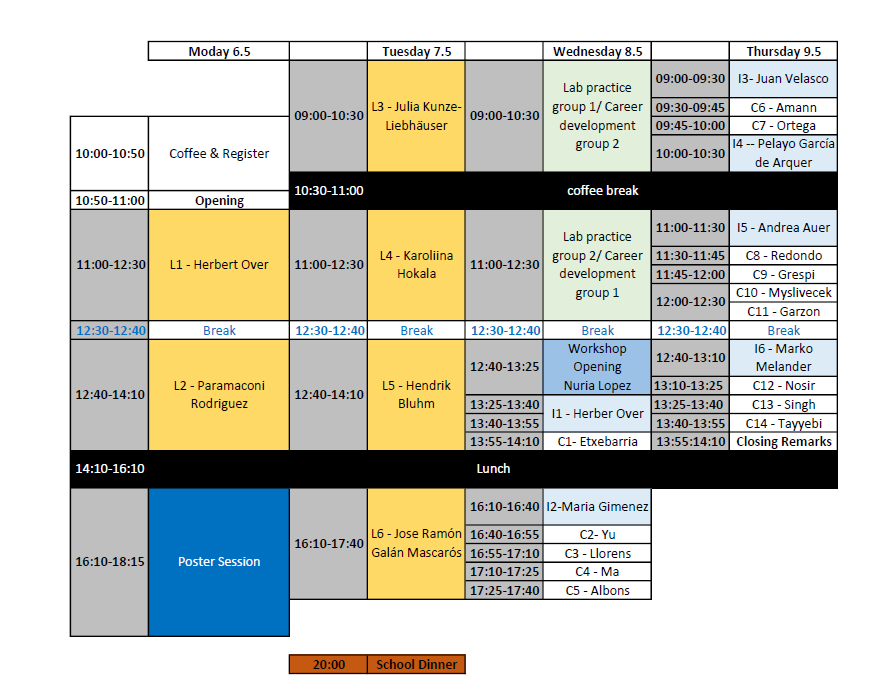Program

Lectures
-
L1: Model catalysts: study of reaction dynamics, kinetics and structural properties, Herbert OverUniversity
-
L2: In situ FTIR: a powerful tool to understand the electrochemical interphase, Paramarconi Rodriguez
-
L3: When surface science meets electrocatalysis, Julia Kunze-Liebhäuser
-
L4: Introduction to Electrocatalytic Interfaces, Karoliina Honkala
-
L5: Investigation of liquid-solid and liquid-vapor interfaces by ambient pressure XPS, Hendrik Bluhm
-
L6: Fundamental concepts in catalyst design, José Ramón Galán-Mascarós
Workshop
Invited
-
I1: Opening Keynote: Towards the integration of Experiments and Theory in electrocatalysis - Nùria López, Institute of Chemical Research of Catalonia ICIQ
-
I2: Dissolution Stability of IrO2(110) and RuO2(110) Based Model Anodes in
Acidic Water Electrolysis -- Herbert Over, Justus Liebig University -
I3: Advancements in Functional Materials for Sustainable Energy Technologies -- María Gimenez López, Centro Singular de Investigación en Química Biolóxica e Materiais Moleculares (CiQUS)
-
I4: Visualizing solvent structures at electrified solid-liquid interfaces by electrochemical atomic force microscopy -- Andrea Auer, University of Innsbruck
-
I5: Electrolysis technologies and their challenges for sustainable solar fuels -- Pelayo García de Arquer, ICFO
-
I6: Physical chemistry + density functional theory = better atomistic models of electrochemical interfaces and reactions -- Marko Melander, University of Jyväskylä
- I7: Characterization of electrocatalytic interfaces by X-ray spectroscopies and scanning electron microscopy under relevant working conditions -- Juan Jesús Velasco Vélez, CELLS ALBA
Contributed
-
C1: Epitaxial thin film nickel oxide catalysts doped with iron for the oxygen evolution reaction - Ane Etxebarria
-
C2: Cation Vacancies Regulate the Electron Spin Configuration of Cathode Catalytic Additives towards Robust Li-S Batteries - Jing Yu
-
C3: Exploring High-Performance Non-Noble Metal-Based Catalysts for the Oxygen Evolution Reaction with Transmission Electron Microscopy - David Llorens Rauret
-
C4: Surface compositional modification of Weyl semimetal Co3Sn2S2 from vacuum to OER conditions - Li Ma
-
C5: BaTiO3 characterized at the atomic scale: surface structure and its ferroelectric behavior - Llorenç Albons Caldentey
-
C6: Gaining Insight Into Methanol Synthesis Reaction Using The High Pressure X-ray Photoelectron Endstation POLARIS - Peter Amann
-
C7: Simulating high-pressure surface reactions with molecular beams - Enrique Ortega
-
C8: Investigating the electrooxidation of Au in basic and acidic media - Jesús Redondo
-
C9: Probing The Electrode-Liquid Interface Using Operando Total-Reflection X-ray Absorption Spectroscopy - Andrea Grespi
-
C10: Functionalization of Pt(111) electrodes using surface science methods - Josef Mysliveček
-
C11: Insights into the degradation of metallic core-shell nanoparticles under fuel cell conditions by 3D identical location STEM - Alba Garzón Manjón
-
C12: Exploring the Catalyst Function of Ionic Liquids in Polyethylene Terephthalate Glycolysis by Molecular Dynamics Simulations - Mohamed Nosir
-
C13: Theoretical Study of Nitrogen Reduction over MXenes - Diwakar Singh
-
C14: Photoelectrochemical Solar Ammonia Production - Ahmad Tayyebi
Posters
-
P1: Oxygen Reduction Reaction on gold-supported FePC and CoPC networks:
Bridging Theory with Experimental Insights - Paula Abufager -
P2: Enhanced Characterization of Surface Adsorbates with a Novel Infrared Reflection-Absorption Spectroscopy Setup - Nail Barama
-
P3: Nanostructural Insights into Sb-doped CoOx Model Catalysts for Acidic Water Oxidation - Ramadan Chalil Oglou
-
P4: Enhanced Electrode Performance and Stability in Electrochemical Flow Cells for Clean Hydrogen Production - Lorenzo Forzanini
-
P5: Studying Catalytic Reactions Using Ambient Pressure X-ray Photoelectron Spectroscopy - Hrag Karakachian
-
P6: Elucidating the internal structure of a new supramolecular electrolyte - Garoé Medina-Aguilar
-
P7: 2D supramolecular networks as model systems for single-atom catalysis - Sofia O. Parreiras
-
P8: Recovery of metals from waste streams using an electroleaching process - Guillermo Pozo
-
P9: Advancing BiVO4 Photoanodes for Water Splitting: Up-scaling and Sustainable Industrial Prospects - Christian Robles
-
P10: Operando X-Ray Diffraction Studies of Co3O4 Catalysts during Oxidation Reactions - Carl Hendric Scharf
-
P11: Electrochemical characterization of ion-eroded single-crystalline metal electrodes - Jan Škvára
-
P12: CO-induced dimer decay responsible for gem-dicarbonyl formation on a model single-atom catalyst - Panukorn Sombut
-
P13: Surface Science on Stainless steel in the austenitic and martensitic phase - Sreehari Sreekumar
-
P14: 2D materials for water electrolysis - P V Sruthibhai